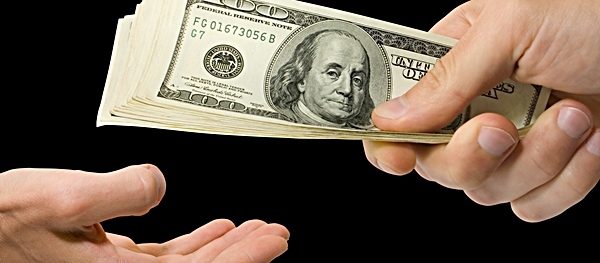Single-payer tax terrifying to Vermonters, but fee hikes a ‘silent killer’

By Bruce Parker | Vermont Watchdog
After spending more than 30 years building homes in Vermont, Bart Frisbie has learned there’s more than one way for the state government to get its money.
If they’re not raising taxes, they’re raising fees.
“Fees that go with regulations get notched up constantly,” Frisbie, president of Sterling Construction, an energy-efficient homebuilder in South Burlington, told Vermont Watchdog this week.
GIVE US YOUR BENJAMINS: Annual hikes on fees, though hidden from public view, create a significant burden for businesses and professionals.
Many Vermonters have heard about the bone-crushing taxes that could be coming if Gov. Peter Shumlin presses ahead with single-payer health care. The proposed single-payer system comes with the threat of a 29 percent state sales tax — easily the highest rate in the nation —but Frisbie says there’s more to be worried about. Fee hikes are a silent killer lurking in the shadows for businesses and professionals.
“While the Legislature may say, ‘Oh, we have not raised taxes’ or ‘We have raised taxes only on the side,’ the fees that go with the permits we have to obtain escalate all the time. So, those make the risk and cost of doing business increase constantly.”
A glance at this year’s expected fee hikes reinforces Frisbie’s claim.
If lawmakers approve H.735, Vermonters will see increases in the following fees:
- License renewal for funeral homes and crematoriums: $900 (up from $540)
- License renewal for funeral directors and embalmers: $350 (up from $300)
- License renewal for registered and licensed practical nurses: $140 (up from $95)
- License renewal for real estate brokers and sales people: $200 (up from $175)
- License renewal for corporations and partnerships: $200 (up from $75)
- License renewal for sellers of lottery tickets: $50 (up from $15)
- License renewal for professional engineers: $100 (up from $80)
Fee hikes aren’t for license renewals only. Under H.735, employers who hire lobbyists will have to pay a registration fee of $50 (up from $25), mobile home park owners will pay $12 per leased occupant (up from $9), and Vermonters who pay the Department of Taxes or the Department of Motor Vehicles online will pay a 3 percent fee.
Frisbie, who has been building homes in Vermont since 1979, said keeping up with regulations is a continual process where “everything gets harder, takes longer and costs more.”
Two fees that have received widespread attention — mostly due to swirling controversies — include a $200 fee on toxic chemicals used in the manufacture of children’s goods and a $25 retrieval fee for weapons confiscated following a judge’s restraining order.
With single-payer set to take effect in 2017, the public has learned much about massive new taxes related to Green Mountain Care — though little about fees. Vermont may soon have the distinction of being the only state in the Union with a 29 percent sales tax. No one knows for sure, however, since Gov. Peter Shumlin refuses to disclose his plan for financing Green Mountain Care.
Unlike a single-payer tax that could hit Vermonters all at once, Frisbie said hikes to government fees are “a steady progression that just keeps happening.”
“It’s environmental, it’s energy, it’s labor regulations, it’s workers comp — everything is incremental. No single increase is killing the economy, but the cumulative impact is significant,” Frisbie said.
When asked how businesses plan to pay for these higher costs, Frisbie said the costs will get passed on to the consumer.
“If we don’t pass on costs, we’re out of business,” he said. “But it makes it much harder and more expensive for the Vermonter who is trying to buy or remodel a house and live here.”
Contact Bruce Parker at bparker@watchdog.org







